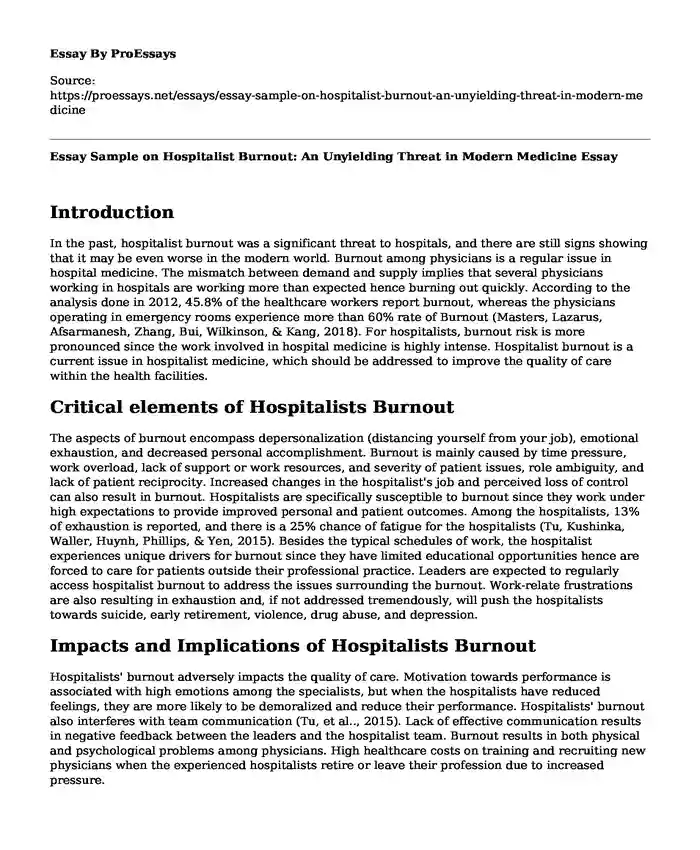Introduction
In the past, hospitalist burnout was a significant threat to hospitals, and there are still signs showing that it may be even worse in the modern world. Burnout among physicians is a regular issue in hospital medicine. The mismatch between demand and supply implies that several physicians working in hospitals are working more than expected hence burning out quickly. According to the analysis done in 2012, 45.8% of the healthcare workers report burnout, whereas the physicians operating in emergency rooms experience more than 60% rate of Burnout (Masters, Lazarus, Afsarmanesh, Zhang, Bui, Wilkinson, & Kang, 2018). For hospitalists, burnout risk is more pronounced since the work involved in hospital medicine is highly intense. Hospitalist burnout is a current issue in hospitalist medicine, which should be addressed to improve the quality of care within the health facilities.
Critical elements of Hospitalists Burnout
The aspects of burnout encompass depersonalization (distancing yourself from your job), emotional exhaustion, and decreased personal accomplishment. Burnout is mainly caused by time pressure, work overload, lack of support or work resources, and severity of patient issues, role ambiguity, and lack of patient reciprocity. Increased changes in the hospitalist's job and perceived loss of control can also result in burnout. Hospitalists are specifically susceptible to burnout since they work under high expectations to provide improved personal and patient outcomes. Among the hospitalists, 13% of exhaustion is reported, and there is a 25% chance of fatigue for the hospitalists (Tu, Kushinka, Waller, Huynh, Phillips, & Yen, 2015). Besides the typical schedules of work, the hospitalist experiences unique drivers for burnout since they have limited educational opportunities hence are forced to care for patients outside their professional practice. Leaders are expected to regularly access hospitalist burnout to address the issues surrounding the burnout. Work-relate frustrations are also resulting in exhaustion and, if not addressed tremendously, will push the hospitalists towards suicide, early retirement, violence, drug abuse, and depression.
Impacts and Implications of Hospitalists Burnout
Hospitalists' burnout adversely impacts the quality of care. Motivation towards performance is associated with high emotions among the specialists, but when the hospitalists have reduced feelings, they are more likely to be demoralized and reduce their performance. Hospitalists' burnout also interferes with team communication (Tu, et al.., 2015). Lack of effective communication results in negative feedback between the leaders and the hospitalist team. Burnout results in both physical and psychological problems among physicians. High healthcare costs on training and recruiting new physicians when the experienced hospitalists retire or leave their profession due to increased pressure.
Preventing Hospitalist Burnout
Preventing burnout among the hospitalists is an issue that should be majorly directed to the leadership. Harnessing leadership powers contributes positively while addressing burnout. Leadership should be organized and only allow the physicians to engage in the roles within their areas of expertise. The hospitalists will enjoy doing the tasks they are trained for rather than extending beyond their areas of interest (Masters et al., 2018). Team coordination is essential where communication is enhanced among the staff. Through effective communication, the hospitalists are likely to understand their roles and perform them with a lot of commitment. Hospitals should ensure that they have sufficient resources to support a well-coordinated system of care for the patients.
Conclusion
Generally, hospitalists' burnout is a typical issue in modern healthcare facilities. Burnout occurs mainly when the physicians' workload increases, and in the process, they get pressurized and frustrated. Hospitalists' burnout severely affects the quality of care. To address the issue of exhaustion, the leadership role should be harnessed to ensure that training is provided to the staff, and one engages only in their area of specialization.
References
Masters, C., Lazarus, M., Afsarmanesh, N., Zhang, A., Bui, P., Wilkinson, R., & Kang, M. (2018). In pursuit of happiness: Creation of an academic hospitalist wellness committee and well-being survey. American journal of hospital medicine, volume 2, issue 2 (2018 April-June). https://doi.org/10.24150/ajhm/2018.008
Tu, S. P., Kushinka, J., Waller, R., Huynh, C., Phillips, A., & Yen, M. S. (2015, June). Capability for Change: Association of Adaptive Reserve and Self-Reported Burnout Among Inpatient Medicine Physicians and Nurses. In the 2015 Annual Research Meeting. AcademyHealth. https://rampages.us/dgimpodcast/wp-content/uploads/sites/7625/2016/02/Tu-AR-Burnout.pdf
Cite this page
Essay Sample on Hospitalist Burnout: An Unyielding Threat in Modern Medicine. (2023, May 06). Retrieved from https://proessays.net/essays/essay-sample-on-hospitalist-burnout-an-unyielding-threat-in-modern-medicine
If you are the original author of this essay and no longer wish to have it published on the ProEssays website, please click below to request its removal:
- Blood Glucose Levels Effect on Binge Eating Disorder Episodes
- Restrictive Eating Behaviors Are a Non-Weight-Based Marker of Severity in Anorexia Nervosa
- Cognitive Behavior Therapy for People With Schizophrenia Essay
- The Principal Concepts and Theories of Personal and Professional Development
- Paper Example on Personal Ethics, Values and Orientation to Counseling
- Essay on Biological and Cognitive Perspectives of Psychology: Analysing Behaviour
- Research Paper on Autism in Children: Causes and Symptoms







